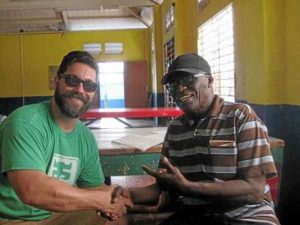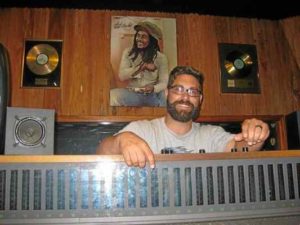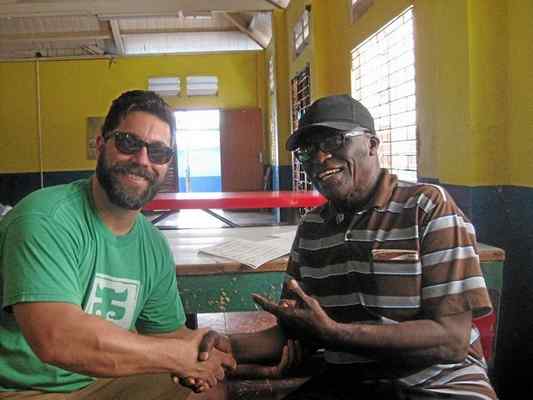I peered out of the entrance of the Anglican church atop Jack’s Hill and reflected upon the previous eight days. Old Kingston Town began to awaken and bustle below. Quietly occupying a pew in the back of the open-air church, I smiled at just how Harry Belafonte had duped us all in song some 50 years ago.
 It was music that had inspired my adventure. On a trip to Tower Records at age 14, I bought an album called “Uprising.” Perhaps it was kismet that influenced the purchase, or maybe it was the way that Bob Marley was portrayed rising from the Earth, his hair locked and flowing downward, firmly rooting him in the planet. His clinched, raised fists called out to me and thousands of other “angsty” teens, lost everywhere — or at least lost down the poorly lit World Music aisle of Tower Records.
It was music that had inspired my adventure. On a trip to Tower Records at age 14, I bought an album called “Uprising.” Perhaps it was kismet that influenced the purchase, or maybe it was the way that Bob Marley was portrayed rising from the Earth, his hair locked and flowing downward, firmly rooting him in the planet. His clinched, raised fists called out to me and thousands of other “angsty” teens, lost everywhere — or at least lost down the poorly lit World Music aisle of Tower Records.
That was 20 years ago, and now as I sat in the parish of my host and guide, Courtney, I marveled that as a school teacher, I was able to come to Jamaica to record my music in the studio of the man who inspired me as an artist.
This elation, however, was tempered by what I had observed during the long days of my stay, and even longer nights after recording sessions each evening.
After listening to reggae music for 20 years, I knew that not all of Jamaica would be the idyllic image set forth in the advertisements of resort vacations. In fact, my trip abroad wouldn’t be a vacation at all, but a pilgrimage.
And so, in order to see the city by day I volunteered to work with Courtney as his assistant on plumbing jobs throughout Kingston. This afforded me a firsthand glimpse of the city, not as a vacationer but as a momentary local.
On the job I would invite anyone to wax on in their deliberate and poetic way of explaining the common happenings, just to hear them speak. This engagement of others helped me soak up local culture and vernacular. I learned early that while Jamaican swear words might sound like the names of characters from children’s cartoons, it would certainly be inappropriate to use them in every social circle.
Approaching evenings ushered in cooler weather as the sky turned purple above us. I was thankful for this relief as we drove back up the foothills of the Blue Mountains to Courtney’s little hostel. The path wound up the hill like a snake. Adding to the peril of the trek, we were flanked on my side of the vehicle by the shear cliff dropping off from the road. Jamaica, previously part of the British Commonwealth, had maintained driving on the left.
After a quick shower and change we were back down the hill and on to Tuff Gong Recording Studios. Kingston’s scent, the familiar amalgam of industry, ocean, and tropical-earth flooded into the cabin as we raced to make my recording session on time.
Waiting at the gate of the studio compound, I felt that I was about to enter onto hallowed ground. Bob Marley’s legacy was still palpable and lingered around us like incense.
As an outsider I didn’t feel accepted until night four of recording. Regardless, the staff and session musicians had a charm so tangible and desirable that it was easy to get swept up in their manner of speaking. It didn’t matter to me that the majority of the subject of communication was to poke fun of me. Laughter and bright smiles would follow each exchange, and I soon joined in. The anxiety I had built up in anticipation drifted away and I felt happy.
 They seemed pleased that I had an interest in their indigenous music and was able to write and sing in the style. My heart would leap when the control room door opened to another artist or musician on site peeking in to see who was recording.
They seemed pleased that I had an interest in their indigenous music and was able to write and sing in the style. My heart would leap when the control room door opened to another artist or musician on site peeking in to see who was recording.
One studio visitor was Julian Marley, Bob’s son. He was rehearsing with his band in the next building in preparation for his new tour. When I had finished recording my vocals and needed backup singers, the head engineer nonchalantly walked out and into Julian’s practice, pulling his back-up singer to perform on my record.
This pattern continued throughout the week. However, new events and eye-opening lessons were shuffled into the routine like cards in a deck.
It was difficult to see what some have to do to survive the harsh city environment. With little to no social welfare and a large unemployment percentage, it wasn’t uncommon to see homes built from pallets and scrap corrugated steel. Often I’d observe those homes illegally wired into city power, telephone and plumbing. Courtney would grin as he pointed it out to me. He seemed to appreciate my butchering of the patois and idiom: “necessity breed invention.”
Leaving the studio at midnight each evening, we were met with the familiar recall of gunfire in and around the neighborhood. Various rum joints were just now opening their doors as DJ’s, called Selectas, were beginning to spin their bass-heavy set lists to crowds of meandering partygoers.
I left Kingston on a night such as this with three songs and a new perspective. I have since said that, “the poorest we might future be, is the richest many will every be.” This experience in Kingston was worth the exhaustive, humid workdays and sleepless nights.
Nico Marks is a Long Beach musician, writer and educator. For a sampling of his work, visit www.nicomarksmusic.com.
